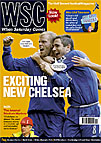 After the death of a steward following incidents at Aston Villa's Carling Cup tie with QPR, Dave Woodhall wonders if it is time for the police to increase their presence at games
After the death of a steward following incidents at Aston Villa's Carling Cup tie with QPR, Dave Woodhall wonders if it is time for the police to increase their presence at games
If I had a pound for every time I’ve been asked the question: “Is football violence on the way back?” I’d be a lot better off than I am now. The answer, of course, is that it never entirely died out. The average Premiership attendance is around 35,000 and in a crowd of that size there will inevitably be some undesirables. Hooliganism happens, but it’s rare and the chances of getting caught up in the type of pre-planned violence that forms the majority of skirmishes loosely based around football is so small as to be not worth worrying about.
Which is why the events of September 22 were so disturbing, even before their tragic consequences. The Carling Cup tie between Aston Villa and Queens Park Rangers was never, on the surface, likely to see any real problems. Neither club has supporters with a bad reputation and Villa Park must, over the years, have been the most trouble-free major ground in England. Yet after the game, a fight broke out outside the away end, on Witton Lane. As the fixture had been deemed police-free, it was the responsibility of Villa stewards to attempt to calm matters down and, to their credit, they did a reasonable job in difficult circumstances.
The following day saw comments on the respective clubs’ unofficial websites. Villa supporters were scornful of the irritating handful of idiots who have taken to inhabiting the back of the Holte End in recent seasons, while Rangers fans criticised the intelligence passed on by the Metropolitan Police to their West Midlands counterparts. Their club had apparently sold 1,800 tickets before the game, a large number intended to pay on the gate and Rangers supporters had already been involved in several incidents this season, most notably at Stoke. There were other comments along the lines of “boys will be boys and it’s not like it was compared to our day”, while the hoolie-boards were full of the predictable claims that “60-handed and we dun U OB nowhere”.
The incident was slowly forgotten, until two weeks later it emerged that a Villa steward, David Ireland, had died in hospital. An initial post-mortem proved inconclusive, but police confirmed that they were connecting Mr Ireland’s death with injuries he had received during the disturbances after the game.
The whole incident raises some serious questions, about how matches are policed in the current financial climate and the way in which events unfolded on the night. While the trend towards better-trained stewards and less overt policing at grounds was initially welcomed, it may be time for a rethink. A steward will never be as able to cope with lawbreaking as a police officer, no matter how attractive going for the cheaper option appears to clubs who are now wondering who will become the next Leeds. And shouldn’t thousands of people gathered in a potentially volatile situation always require the presence of uniformed police, ev-en if only to act as a reassurance that all potential emergencies are capable of being dealt with?
Fans who can remember the West Midlands as the most heavily policed football area in the country may well be amazed at the shortage of uniforms at the game and also their reaction. It was obvious that the large travelling support meant there was the possibility of disorder and there had been some minor problems before kick-off, resulting in a brief intervention from a squad car. Yet there were no police in evidence at the final whistle. Indeed, when fighting broke out, it took almost half an hour for them to arrive, despite the Queens Road station being a few hundred yards away.
Both Villa and the police have assured the public that they are working together to catch the culprits. Neither wished to comment on the specifics of police-free games, the events of the evening in question, nor the extent to which stewards are adequately prepared to deal with public-order incidents outside the ground.
Someone has died at a football match. It was a sad and utterly avoidable death. I hope lessons have been learnt and that such a tragedy never happens again. I wish I had a pound for every time that previous sentence has been written.
From WSC 214 December 2004. What was happening this month